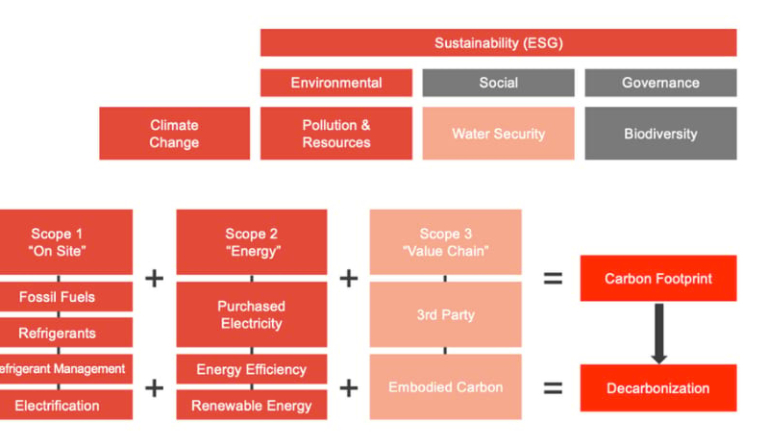Blog
Published: June 10, 2022
Demystifying Decarbonization: A Restaurant Owner and Facility Manager Survival Guide
As public and private pressure to reduce greenhouse gas emissions increases across industries, restaurants face several challenges to create more sustainable operations. Gas equipment is the norm in many kitchens and cannot easily be replaced with a cleaner energy source, razor-thin margins don’t allow for major capital investment projects, and many restaurants are still recouping from the impact Covid-19 had on their business. Improving indoor air quality and airflow to get customers back while keeping staff and guests experience a top priority.
Quick Facts
- Industry
- Restaurant
- Topics
- Sustainability • Services

About the author
Trevor Joelson, Decarbonization Program Lead – Key Accounts
Trevor Joelson is a program lead for Trane’s decarbonization program for key account customers. Through this program, Trevor collaborates with larger enterprises to define their environmental sustainability objectives and establish initiatives and programs to reduce operational emissions through financially attractive and measurable projects.
Trevor joined Trane through an acquisition of Fellon-McCord in 2016 and has held various roles in corporate energy & sustainability management over the last decade. His subject matter expertise is in the energy markets and how the supply-side of energy connects to the built environment.
Trevor lives with his family in Dallas, TX and is a graduate of the University of Louisville.
As public and private pressure to reduce greenhouse gas emissions increases across industries, restaurants face several challenges to create more sustainable operations. Gas equipment is the norm in many kitchens and cannot easily be replaced with a cleaner energy source, razor-thin margins don’t allow for major capital investment projects, and many restaurants are still recouping from the impact Covid-19 had on their business. Improving indoor air quality and airflow to get customers back while keeping staff and guests experience a top priority.
But it’s critical to get a handle on your sustainability goals and develop a realistic plan to achieve them. This blog is meant to be used as a guide to help restaurant owners and facility managers get on the right path to creating a decarbonization (decarb) plan that will help to meet the goals of today and set the restaurant up for long-term energy and cost savings, as well as increased operational resiliency, well into the future.
Let’s start with some definitions
When it comes to the sustainability space there are a ton of terms and acronyms that can get confusing. Word choice and clarity matter to ensure everyone is aligned with what you’d like to accomplish.
- Greenhouse gasses (GHG) are the gasses that trap heat in the atmosphere, for example, methane, CFCs, and H2O.
- Carbon dioxide equivalent (CO2e) includes CO2 and other greenhouse gasses.
- Decarbonization is any process that removes carbon from the atmosphere or prevents carbon from being emitted.
- Carbon neutral is when GHG released into the atmosphere is equal to GHG removed from the atmosphere.
- Global warming potential (GWP) is the degree to which a gas traps heat in the atmosphere, indexed relative to Co2, which has a GWP of 1.
Generally speaking, there are two types of emission sources:
Direct emissions are related to onsite processes, i.e. fossil fuels used for heating and cooling or refrigerant management.
Indirect emissions are related to off-site electricity production.
By looking at efficiency options that impact both direct and indirect emissions, you’ll identify the various levers you can pull to develop a decarbonization plan best suited for your facility.
3 Steps to Successfully Decarbonize your Restaurant
Step 1: Understand where the decarb initiative is coming from to determine appropriate goals for each location in your portfolio
You’re likely feeling the pressure to become a more sustainable operation from multiple sources. And it’s important to understand the nuances of each so that you know what emission reduction goals you’re accountable to meet.
Policy & Regulatory
There is no shortage of regulations aiming to help achieve a more sustainable future. From overarching policies like the Paris Agreement to nationwide goals like the Department of Energy’s 2023 efficiency requirements for residential and commercial HVAC equipment to varying local policies and regulations across the U.S. Making sense of the complex weave of regulations that impact each of your restaurant facilities can be overwhelming. Coordinate with experts to help you navigate the regulatory landscape, so you have clear guidance on emissions requirements across your portfolio of restaurants.
Public Pressure
With climate change growing in importance in the minds of everyday Americans, people increasingly expect businesses to operate responsibly and ethically. More and more customers consider the environmental practices of their favorite brands and employees are demanding responsibility from their employers.
Investors
Because of this increase in public pressure, investors are also under the microscope to ensure that the businesses they invest in have emission reduction plans in place. In addition, franchisee restaurants have a unique stakeholder in that the corporate brand will often make emission reduction goals that the franchisees are then responsible for meeting.
Step 2: Determine your current emissions baseline
To understand where you want to take your business in the future, you must first get a baseline understanding of your current energy and emissions landscape. Getting honest about your current carbon footprint provides a realistic view of how to build a realistic and effective decarbonization strategy.

As is illustrated in the graphic below, three components make up your sustainability program: Environmental, Social, and Governance – commonly referred to as ESG. Your carbon footprint is comprised of three “Scopes” – Onsite, Energy, and Value Chain.
- Scope 1 “Onsite” emissions are emissions used directly within your operations and are commonly made up of fossil fuels.
- Scope 2 “Energy” emissions are electricity purchased from the electrical grid. While you are accountable for these emissions, it is not directly in your control.
- Scope 3 “Value Chain” emissions are a more complex set of emissions related to the creation and transportation of products and services.
Making changes to reduce emissions in any of these three scopes is how you achieve decarbonization. Working with an expert, you can determine the appropriate mix of initiatives within this framework to achieve your sustainability goals.
Step 3: Make a Restaurant Decarbonization Plan
Decarbonization for restaurants comes down to three main components: Energy Efficiency, Electrification, and Renewable Energy. Let’s look at what goes into each component.
Energy Efficiency
The goal of energy efficiency is to improve the building’s infrastructure to eliminate waste in your operations. This can be done by upgrading to more efficient equipment, making improvements to limit the heat entering or escaping from the building, or reducing the load it takes to heat or cool the space.
The process of becoming more energy efficient starts with simple, cost-effective measures such as identifying and addressing unnecessarily air leaks to installing sophisticated building automation systems that monitor energy use and waste in real-time. A great way to gain greater restaurant efficiency is to start with an energy assessment.
Upgrading to high energy efficient equipment, including HVAC and lighting, helps to reduce the overall cost of ownership and may help to improve the energy efficiency within your restaurant. Installing automation equipment allows you to centrally monitor and manage buildings across the country, leading to significant savings. Your HVAC expert can work with you to find ways to pay for building upgrades now by using future energy savings.
Electrification
To create a greener energy grid, electricity is increasingly moving to more renewable energy sources like solar and wind. This means electricity is becoming less emission-intensive across the U.S. One of the best ways to take advantage of these greener energy sources is to electrify your heating and cooling operations. An emerging strategy in decarbonization, you can replace your natural gas boiler system with high-efficiency heat pumps. This single piece of equipment that is used for both heating and cooling will remove nearly all onsite direct emissions from your operations. This is a huge advantage for any restaurant looking to achieve decarbonization goals.
Since energy companies are making significant investments to update the grid, many are incentivizing customers to take advantage. The right expert can help you determine how you can receive reimbursements from energy companies that can go towards paying for electrification updates.
Renewable Energy
Restaurant operators can leverage renewable energy as a tool to reduce emissions while gaining more control over their energy supply. While renewable energy has historically been seen as a “cost premium” to traditional energy sources, there are emerging models that allow buildings to secure renewable energy at a discount to traditional power sources.
There are two main ways to secure renewable energy:
- Onsite: A renewable energy asset or system is installed at the facility and provides energy supply directly to the building.
- Offsite: A commitment is made to an offsite renewable energy asset (likely a large utility-scale development) that allows the owner to recognize the renewable energy attributes.
Restaurant operators should explore all the renewable energy options available to them and identify which one has the best alignment and significant returns to the business.
Restaurant owners and facility managers will have growing pressure to decarbonize their operations in the years to come. There are unique challenges, as well as immense benefits, that come with reducing emissions while not impacting core business operations and customer experiences. Balancing these challenges by developing a roadmap to decarbonization that focuses on creating financially attractive solutions to achieve your goals is a core competency of Trane.
Looking to begin, accelerate or complete your restaurant decarbonization journey? Connect with a Trane restaurant expert to develop a financially attractive solution to meet your sustainability ambition.
